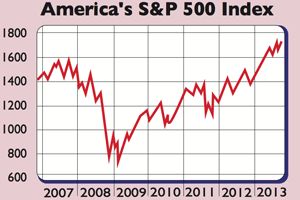Get the latest financial news, insights and expert analysis from our award-winning MoneyWeek team, to help you understand what really matters when it comes to your finances.
You are now subscribed
Your newsletter sign-up was successful
Want to add more newsletters?

Twice daily
MoneyWeek
Get the latest financial news, insights and expert analysis from our award-winning MoneyWeek team, to help you understand what really matters when it comes to your finances.

Four times a week
Look After My Bills
Sign up to our free money-saving newsletter, filled with the latest news and expert advice to help you find the best tips and deals for managing your bills. Start saving today!
Global equities have celebrated the end of the US fiscal standoff by rising to new post-crisis or record highs. America's S&P 500, which sets the tone for world markets, has reached a new all-time peak above 1,750. It has gained 160% since it bottomed in March 2009.
The latest drama in Washington was "ugly and disruptive" for markets, says E S Browning in The Wall Street Journal, and it trimmed annualised growth, currently running at around 2%, by 0.5% in the fourth quarter.
And there could well be a repeat early next year, as the deal ending the dispute only extends until February. "Yet it all has a silver lining."
MoneyWeek
Subscribe to MoneyWeek today and get your first six magazine issues absolutely FREE

Sign up to Money Morning
Don't miss the latest investment and personal finances news, market analysis, plus money-saving tips with our free twice-daily newsletter
Don't miss the latest investment and personal finances news, market analysis, plus money-saving tips with our free twice-daily newsletter
Markets swooned this summer after the US Federal Reserve said it was planning to reduce the pace of its money printing, or quantitative easing, programme.
In September, however, it decided the US economy wasn't quite strong enough to come out of intensive care, and now that Congress has shaken confidence and undermined growth, the Fed may wait until well into the new year before it takes its foot off the accelerator.

Liquidity-addicted investors are, as usual, ignoring the discouraging fundamentals, such as the still-lacklustre global economy and the scope for market bubbles to develop or inflation to surge over the next few years.
Given the unusually uncertain outlook, investors should keep concentrating on markets that are cheap enough to yield healthy long-term returns.
As JP Morgan points out, Europe's cyclically adjusted price-earnings ratio (Cape) has rarely been lower in the past 30 years, while the US's is overvalued on this measure.
In Japan, valuations are little changed despite earnings growth of more than 60% this year, notes Deutsche Bank. Investors should also consider UK blue chips, as Fidelity's Tom Stevenson points out in The Sunday Telegraph.
Six FTSE 100 firms now yield over 5%; 22 yield more than 4%; and around a fifth of the index is selling for less than 12 times earnings.
Get the latest financial news, insights and expert analysis from our award-winning MoneyWeek team, to help you understand what really matters when it comes to your finances.
MoneyWeek is written by a team of experienced and award-winning journalists, plus expert columnists. As well as daily digital news and features, MoneyWeek also publishes a weekly magazine, covering investing and personal finance. From share tips, pensions, gold to practical investment tips - we provide a round-up to help you make money and keep it.
-
 Should you buy an active ETF?
Should you buy an active ETF?ETFs are often mischaracterised as passive products, but they can be a convenient way to add active management to your portfolio
-
 Power up your pension before 5 April – easy ways to save before the tax year end
Power up your pension before 5 April – easy ways to save before the tax year endWith the end of the tax year looming, pension savers currently have a window to review and maximise what’s going into their retirement funds – we look at how

